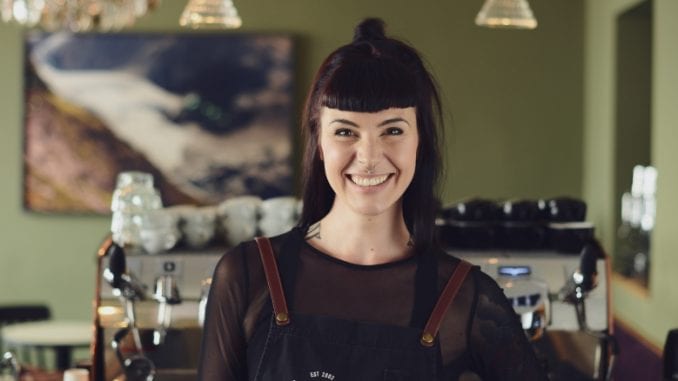
Nicole Battefeld is the 2018 German Barista Champion. The national champion talks about her origin story and what it means to defend her title.
BY CAROLINE CORMIER
SPECIAL TO BARISTA MAGAZINE
Photos courtesy of Tai Lückerath
Nicole Battefeld is currently the head barista at Röststätte Berlin and the 2018 German Barista Champion. Originally from Görlitz, she discovered her passion for coffee at 18 when she landed her first job at a local coffee shop. After a brief foray in the culinary industry, she was hired at Röststätte Berlin, where she has been perfecting her skills as both a barista and roaster since 2014. Beyond her role as head barista at Röststätte’s flagship store, she also serves as a brand ambassador for Victoria Arduino and BWT, and regularly delivers barista training.
In this interview, we learn more about Nicole and how she got into the coffee industry, about her current role at Röststätte Berlin, and the road she took to becoming the 2018 German Barista Champion.
Caroline Cormier: Can you begin by telling us how you first got interested in working in the coffee industry?
Nicole Battefeld: I first started working in the coffee industry when I was 18 years old and had the opportunity to work with really great equipment and passionate bosses in a small café in Görlitz in the east of Germany. I began working there in order to earn money to support my studies, but I immediately fell in love with coffee and customer service. I taught myself how to pour latte art and realized that I could make someone’s day just by serving them a great coffee. After working in this café I went on to study and qualify as a chef, but ultimately I was drawn back to the world of specialty coffee and all it has to offer.
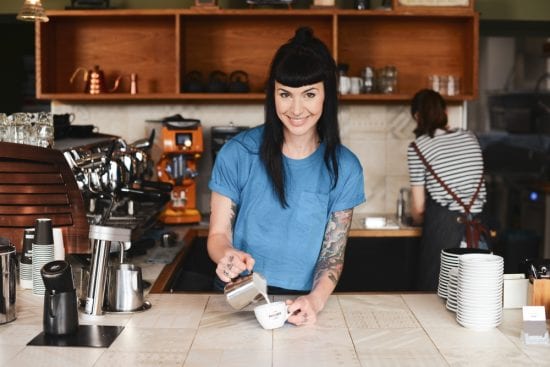
Currently you’re working at Röststätte Berlin as head barista. When and how did you get started there? What does your day-to-day look like?
I began working at Röststätte four years ago, in 2014. Initially I wasn’t allowed to work on the coffee machine, so I began my career there washing dishes and working on the register. After a year, my supervisor realized that I was stubborn and wouldn’t give up trying to learn more about coffee. So, gradually they taught me how to dial in the espresso machine properly. Around the same time, I also began to learn how to roast coffee, as well as studying how all the different machines in our shop worked. Now I am working as head barista, in addition to roasting our blends and single origins, selling equipment, working at conventions, giving classes, and competing in barista competitions.
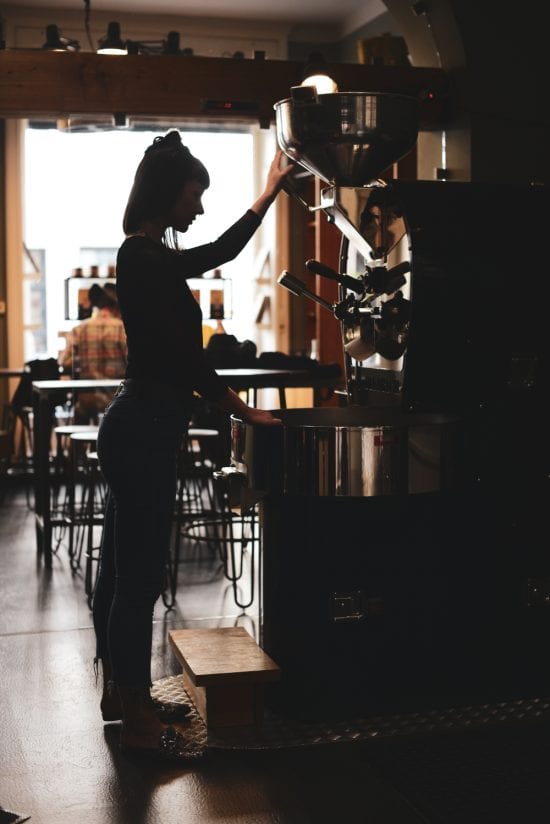
Wow, that sounds very busy! When did you first decide that you wanted to compete? Can you tell us a little bit about what that experience was like?
My first barista competition was the German Barista Championship in 2016. I was super excited to compete and share my passion and skills with other people in the specialty-coffee industry. I trained for around two months and watched all of the World Barista Championship performances between 2010-2015 for inspiration. I also traveled to Dublin in 2016 to watch all the national champions compete on stage. I placed second in the German barista championship, which gave me great motivation to continue competing in the following years.
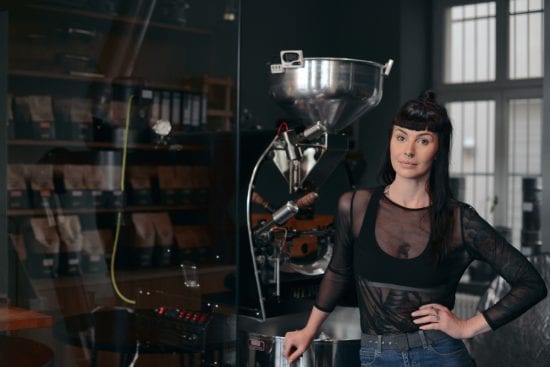
Most recently, you won the 2018 German Barista Championship. Can you tell us a little more about the road that took you there? How did it feel to win the competition?
The German Specialty Coffee Association (SCA) decided not to hold a barista championship in 2017, so my next competition was in February 2018. I trained for around six months and dedicated all of my time outside of work to training and refining my performance. I chose to use a coffee from Colombia, named El Paraiso. In the first round, I was extremely nervous and made some careless mistakes, which convinced me that I wasn’t going to do well—so I thought to myself, I’m not going to win, so I may as well have some fun!
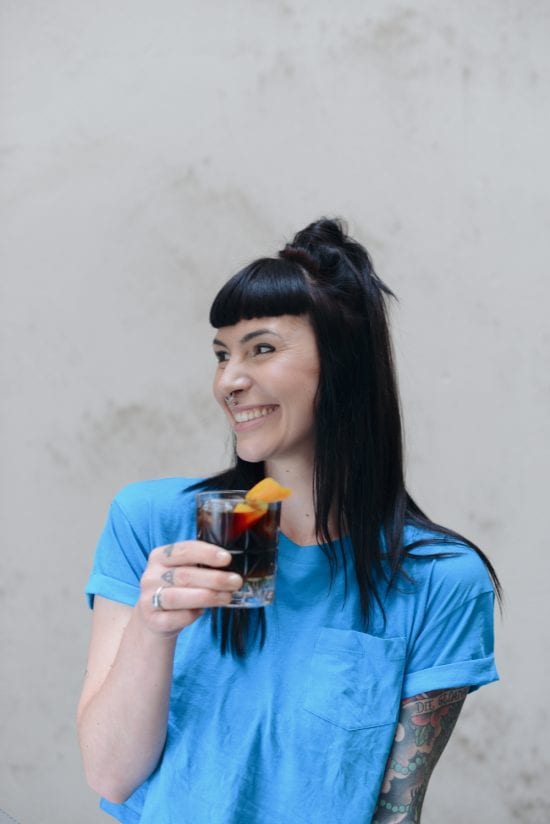
My goal was to give the judges and the audience a great experience, and it felt so much better with this mindset. When they began to announce sixth place, I thought, yep, that’s me. But then they announced fifth, then fourth … eventually, it was down to second and first place. When they called second place and it wasn’t my name, I didn’t think it was real. Then my name was called for first place, and I immediately began to cry (happily!). Winning the German Barista Championship was the greatest reward I could receive for all of my training and represented the years of hard work I have put into trying to perfect my craft.
A few years ago, you were involved with the organization of an event specifically for women baristas as part of the annual Berlin Coffee Festival. How did the idea for a Women’s Latte Art Throwdown come about, and why do you think this is an important addition to the festival?
The idea for the Women’s Latte Art Throwdown came from a collective of female baristas in Berlin. Initially it was very underground and not super popular, but I thought it was a great initiative. When I compete, I always notice that there are very few women, and when I ask different women why they don’t try to compete, they usually respond by saying that they are too shy, or too nervous.
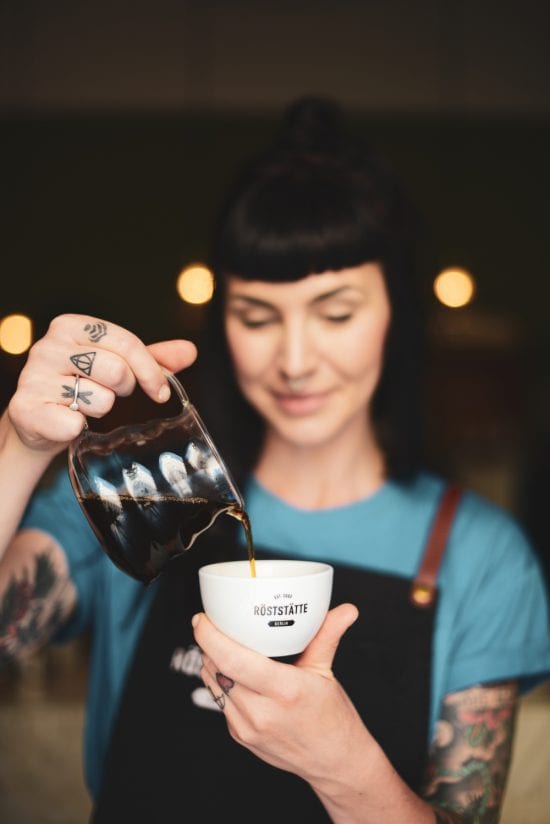
I hosted one of these throwdowns at the Berlin Coffee Festival in 2017, inviting different women from across Germany who work in coffee to compete in a leisurely environment where having fun was the main goal. I still aim to encourage more women across Germany and the world to be confident enough to show their skills in a public forum, because there are so many with amazing skills that deserve recognition.
Do you have any advice for people, especially young women, who are looking to get started as a barista?
I often receive messages from different baristas and coffee enthusiasts across the world, usually via my Instagram account. Sometimes they are just leaving a comment, and other times there are some baristas or people wanting to work in coffee who are asking for advice.
One of the best and most inspiring messages I received in the past few months came from a young woman who was struggling to make her first step into specialty coffee in Greece. She said that it was difficult for her to be recognized as a serious barista and more than a pretty face, but apparently no one had given her a chance or serious training—so she asked me for advice: which cities I would recommend to work in, where to work, etc. She was willing to leave her country for the opportunity to work seriously, as a professional barista. This message struck me because it made me not only realize that women were severely under-represented in coffee, but that I could act as a role model or mentor for different women in specialty coffee across Europe and the world.
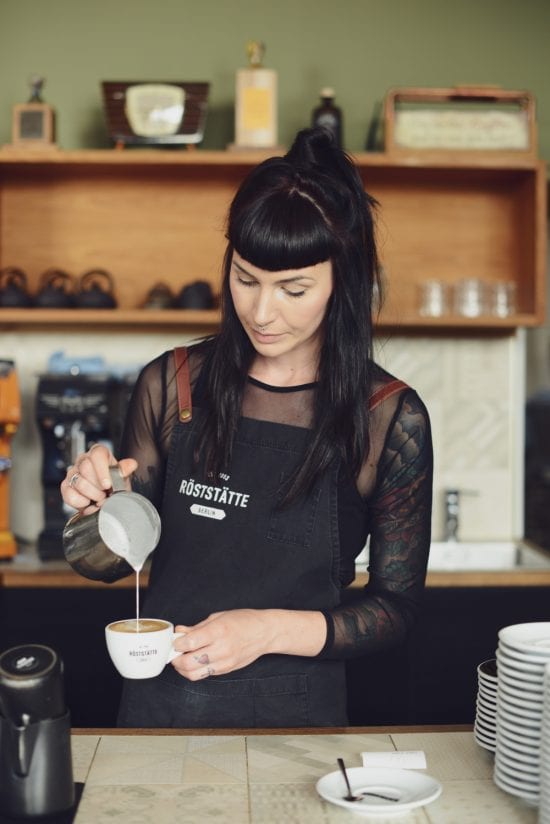
It seems that 2018 was an exciting year for you. What’s in store for you in 2019?
2018 was a remarkable year for me, as I became the German Barista Champion. Unfortunately, due to an accident I was unable to compete at the World Barista Championship in Amsterdam. I spent the rest of the year recovering from injury and thinking about the future and next year’s competition. During this time, Röststätte opened a second premises and we expanded our supply of coffee to various cafés around Berlin – which meant a lot more training and roasting for me!
I have also been training for the past few months for the 2019 German Barista Championship, which will be held in Nürnberg in mid-January. I am more excited than ever to go out on stage and share my ideas and coffee with the judges. No matter what happens in the competition, I feel as though this year will be full of incredible opportunities for me and the specialty-coffee industry as a whole.
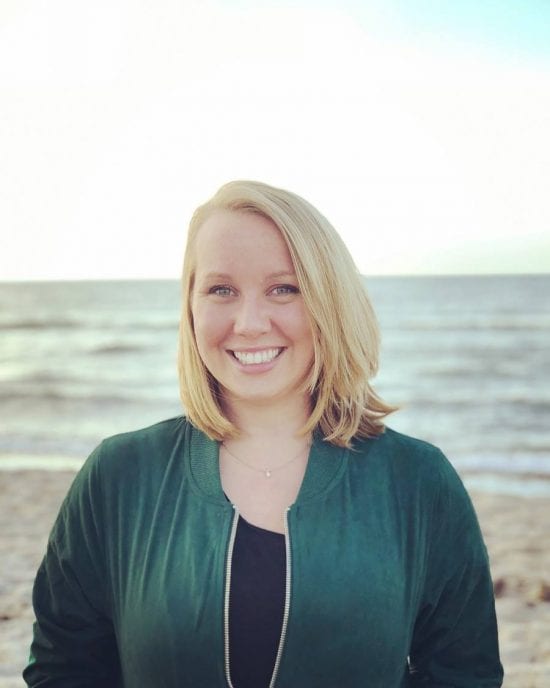
ABOUT THE AUTHOR
Caroline Cormier is a freelance writer from Canada. She currently lives in Berlin, where you can find her digging through archives to discover forgotten stories of the past for her Ph.D., exploring the city’s art and culture scene, or simply enjoying a good cup of coffee at a local café or farmers market.

